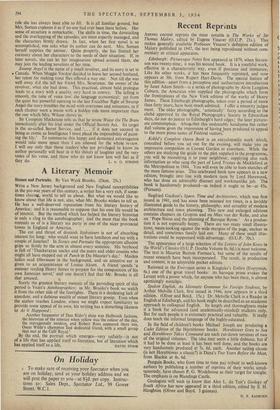A Literary Memoir
Scenes and Portraits. By Van Wyck Brooks. (Dent. 25s.) Wrrn a New Jersey background and New England susceptibilities in the pre-war years of this century, a writer has a very rich, if some- times cloying, world to tell us about. But what we would like to know about that life is not, alas, what Mr. Brooks wishes to tell us. He has a well-deserved reputation from his literary history of America; and it is reasonable to suppose that his own life would be of interest. But the method which has helped the literary historian is only a clog to the autobiographer; and the most that the book reminds us of is a literary tea party in one of the nicer provincial towns in England or America.
The cut and thrust of donnish litterateurs is not of absorbing interest for long: who would want to have luncheon and tea with a couple of Janeites? In Scenes and Portraits the appropriate allusion grips us firmly by the arm in almost every sentence. His boyhood is full of 'Thackerayan uncles and the aunts and older cousins who might all have stepped out of Punch in Du Maurier's day.' Maiden ladies read Obermann in the background, and an attentive ear is given to an acquaintance of Louisa Alcott. A friend spends 'a summer reading Henry James to prepare for the composition of his own Jamesian novel,' and one doesn't feel that Mr. Brooks is all that amused.
Surely the greatest literary memoir of the pervading spirit of this
period is Yeats's Autobiographies; in Mr. Brooks's book we watch it from the other side of the footlights. There is a deadening lack of anecdote, and a dubious wealth of minor literary gossip. Even when the author reaches London, where we might expect familiarity to provide some appeal of its own, his writing has a disturbing likeness to As It Happened : Another frequenter of Dan Rider's shop was Holbrook Jackson, the historian of the nineties when yellow was the colour of the day, the outrageously moderns and Robert Ross appeared there too, a
Oscar Wilde's champion and dedicated friend, with a small group that met at the Café Royal.'
By the end, the portrait which emerges—very unfairly—is not of a life that has applied itself to literature, but of literature which


































 Previous page
Previous page